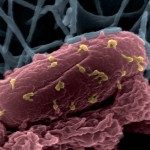Link to Pubmed [PMID] – 7934824
Mol. Microbiol. 1993 Oct;10(2):329-40
Membrane-derived oligosaccharides (MDO) of Escherichia coli are representative members of a family of glucans found in the periplasmic space of Gram-negative bacteria. The two genes forming the mdoGH operon are necessary for the synthesis of MDO. The nucleotide sequence (4759 bp) and the transcriptional start of this operon were determined. Both gene products were further characterized by gene fusion analysis. MdoG is a 56 kDa periplasmic protein whose function remains to be determined. MdoH, whose presence was shown to be necessary for normal glucosyl transferase activity, is a 97 kDa protein spanning the cytoplasmic membrane. To our surprise, these proteins are not homologous to the periplasmic glucan biosynthetic enzymes previously characterized in the Rhizobiaceae family. However, a considerable homology (69% identical nucleotides out of 2816) was discovered between mdoGH and the two genes present at the hrpM locus of the phytopathogenic bacterium Pseudomonas syringae pv. syringae. Functions of these genes remain mysterious but they are known to be required for both the expression of disease symptoms on host plants and the development of the hypersensitive reaction on non-host plants (Mills and Mukhopadhyay, 1990). These results confirm the importance of periplasmic glucans for the physiological ecology of Gram-negative bacteria.

